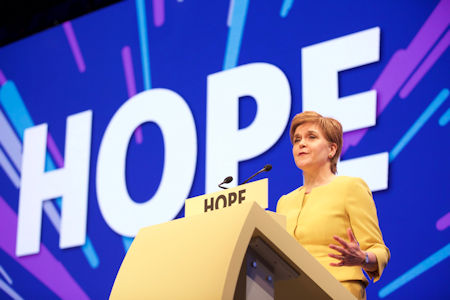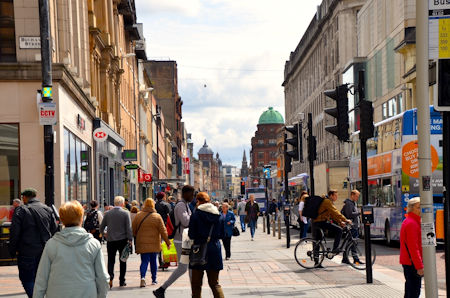The inclusion of glass in Scotland’s proposed Deposit Return Scheme (DRS) is best “both for the planet and for consumers”, says Zero Waste Scotland.
The comments come in response to heavy criticism from the glass industry over the material being part of an upcoming DRS. Trade association British Glass claims including glass could push up the use of plastic drinks containers, result in more glass being landfilled and encourage consumers to choose larger pack sizes. (see letsrecycle.com story)
But Jill Farrell – chief operating officer at Zero Waste Scotland – explained that at a time of climate emergency the opportunity to collect glass through the scheme could not be missed.
She said: “Including glass significantly increases the scheme’s carbon savings. In addition, the volume of glass containers captured in the scheme will make a significant contribution to increasing recycling rates, reducing litter levels and changing consumer behaviour towards all single-use items.”
The Scottish DRS is a key area for Zero Waste Scotland. The organisation promotes recycling and more efficient resource use and is a not-for-profit environmental organisation, funded by the Scottish Government and the European Regional Development Fund.
Material choice
Ms Farrell rejected British Glass’ statement that collecting glass drinks containers through DRS would increase the use of plastic drinks packaging.
She said: “A producer’s choice of packaging material is influenced by a wide range of important factors, including cost and consumer preference. As a result, we expect the introduction of deposit return to have minimal impact on packaging choices.
British Glass had cited DRS schemes in Germany, Finland and Croatia – which include glass – that they say have led to brands and consumers favouring plastic packaging.
“We expect the introduction of deposit return to have minimal impact on packaging choices.”
Popularity
Zero Waste Scotland also questioned a claim that consumers would not bother to use the DRS for their glass and would not claim the deposit back. Ms Farrell commented that the scheme had been designed to make it “as easy for people to get their deposit back as it was to buy the drink in the first place”, minimising the impact of the DRS on consumer choices.
She added: “What’s more, including glass is very popular with the public – 85% of people in Scotland say that glass should be included in the scheme.”
British Glass have commissioned consumer research which found that a quarter of Scottish consumers do not plan to return their glass bottles to collect a deposit.
Rates relief
Whilst the wisdom of including glass in a DRS is under debate, First Minister Nicola Sturgeon has announced that retailers which install a reverse vending machine (RVM) will benefit from rates relief.

Nicola Sturgeon has explained that the Scottish government recognises “the climate emergency” – (picture at SNP conference 2019) – source, Shutterstock
Speaking at the Scottish Grocers’ Federation (SGF) annual conference in Glasgow, the First Minister said: “We recognise the global climate emergency and the need for everyone to work together to improve the lives of current and future generations.
“Retailers will be critical to the success of our planned Deposit Return Scheme and by introducing rates relief, we are supporting them to play their part.”
She added: “Retailers are already taking steps to reduce packaging and I look forward to the introduction of this scheme and the positive change in behaviour it will lead to.”
Ms Sturgeon’s statement will alleviate fears that installing an RVS could increase business rates by making shops which have them more valuable. Shops with an RVS will not be charged extra non-domestic rates because of the value of the machine, but the ‘relief’ does not amount to any financial bonus beyond this.
As many as 3,000 shops are expected to invest in RVMs as a result of the scheme, whilst other stores will operate a manual “over the counter” scheme.
A new 100% non-domestic rates relief for RVMs will take effect from 1 April 2020 in preparation for the scheme going live. The relief will run indefinitely to ensure that non-domestic rates do not rise for retailers as a result of the installation of RVMs.
The post Glass DRS ‘best for planet and consumers’ appeared first on letsrecycle.com.
Source: letsrecycle.com Plastic



